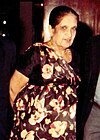Sri Lankan parliamentary election, 1977
|
|
|||||||||||||||||||||||||||||||||||||||||||||
|---|---|---|---|---|---|---|---|---|---|---|---|---|---|---|---|---|---|---|---|---|---|---|---|---|---|---|---|---|---|---|---|---|---|---|---|---|---|---|---|---|---|---|---|---|---|
|
|||||||||||||||||||||||||||||||||||||||||||||
|
All 168 seats to the National State Assembly 85 seats were needed for a majority |
|||||||||||||||||||||||||||||||||||||||||||||
|
|||||||||||||||||||||||||||||||||||||||||||||

Winners of polling divisions. UNP in green, TULF in yellow and SLFP in blue.
|
|||||||||||||||||||||||||||||||||||||||||||||
|
|||||||||||||||||||||||||||||||||||||||||||||
Sirimavo Bandaranaike
Sri Lanka Freedom Party
Junius Richard Jayewardene
United National Party
The 1977 Sri Lankan election heralded the beginning of a new period of Sri Lanka's history - a period of unprecedented violence.
Prime Minister Sirimavo Bandaranaike had become extraordinarily unpopular. Her economic policies had led to industrial growth and self-reliance, but was insufficient to overcome unemployment. Constitutionally, she had taken advantage of the 1972 constitution to delay the election until 1977, instead of 1975 as would have been the case under the old Soulbury constitution. The government's strong Sinhala nationalist stance had led to unrest in the Tamil north; in response, an island-wide state of emergency was imposed, causing hardship to many people. The UF coalition Bandaranaike had built for the 1970 elections had disintegrated.
By contrast, the United National Party had made a surprising comeback since its 1970 humiliation. Under the leadership of J.R. Jayewardene it had assiduously built up its ground organization. The UNP promised to solve the ethnic problem with a devolution package. Economically, it proposed opening up the Sri Lankan economy again. Constitutionally, the UNP called for replacing the Westminster-based political system with one modelled along French lines. Most importantly, it promised a free extra ration of eight pounds of cereal (the so-called eta ata), on top of the existing ration of two kilograms of rice.
...
Wikipedia


